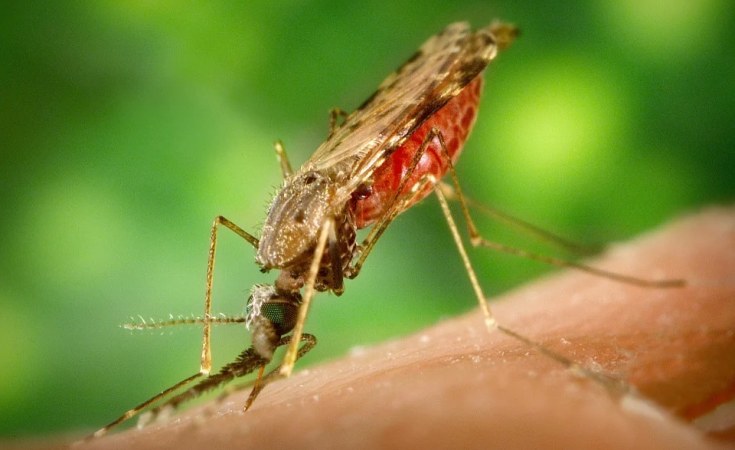
The first rollout of the vaccine will be in Bayelsa and Kebbi, two states with high seasonal transmission of malaria. On Thursday, the Nigerian government received 846,200 doses of the R21/Matrix-M malaria vaccines from GAVI, the Vaccine Alliance. This is the first batch of the vaccine to be handed to Nigeria since it was endorsed by the World Health Organisation (WHO) alongside the RTS,S vaccine in October 2023.
At the handing over ceremony of the vaccine in Abuja, the Coordinating Minister of Health and Social Welfare, Muhammad Pate, described the development as a significant milestone in Nigeria's fight against malaria. He also stated that a balance of 153,800 more doses are expected on 26 October to make it a million malaria vaccines. The minister said Nigeria plans to combine the vaccine with other existing tools proven to be effective in controlling and eliminating malaria in the country.
He said the country plans to "optimise the tools available, such as bed nets, seasonal chemoprevention, intermittent preventive treatment, expanding case management and layering on top of it newer tools like vaccines and tailoring efforts to different parts of the country." As the country prepares to administer the new anti-malaria vaccine and scale up its efforts on malaria elimination and control, here are ten important facts about the new R21 vaccine that you should know. 1.
Malaria vaccine development began 60 years ago Malaria vaccines have been in development for almost 60 years. It began in the 1960s, but it wasn't until 2021 that the first vaccine, RTS,S (Mosquirix), was approved by WHO. The RTS,S vaccine (Mosquirix) was developed by GlaxoSmithKline (GSK), a British multinational pharmaceutical company, in partnership with the PATH Malaria Vaccine Initiative, a non-profit organisation focused on the introduction of vaccines.
screen.width >= 320 && screen.width = 480 && screen.
width = 768 ? ((__lxGc__ = window.__lxGc__ || { 's': {}, 'b': 0 })['s']['_215885'] = __lxGc__['s']['_215885'] || { 'b': {} })['b']['_707261'] = { 'i': __lxGc__.b++ } : {} googletag.
cmd.push(function(){googletag.display('div-gpt-async-ad-center-b');}); The R21 malaria vaccine, on the other hand, is a newer vaccine developed by the University of Oxford and its spin-out company, Vaccitech.
It was approved by WHO in 2023. It was also approved by Nigeria's medicines regulatory agencies last year. 2.
Differences between RTS,S and R21 Both the RTS,S and R21 are intended to protect against Plasmodium falciparum, the most deadly malaria parasite globally. However, the R21 vaccine contains a high dose of the malaria antigen and uses the Matrix-M adjuvant to boost immune response, while the RTS,S uses the AS01 adjuvant system, which helps stimulate an immune response. There's also a difference in the dosage required to guarantee protection from malaria.
However, WHO has said these vaccines have similar effectiveness in clinical trials, preventing around 75 per cent of malaria episodes in areas with a high burden of the disease. The UN agency said there is no evidence showing that one vaccine performs better as they have not been tested in a head-to-head trial. 3.
Vaccine rollout The RTS,S was first piloted in Ghana, Malawi, and Kenya in 2019, but the world's first malaria mass vaccine rollout was in Cameroon in January 2024. There was another rollout in April. Three West African countries , Liberia, Sierra Leone, and Benin Republic, received and rolled out thousands of doses of RTS,S anti-malaria vaccine to children in these countries.
However, Nigeria, despite carrying the highest global burden of the disease, missed out on the vaccine rollout. In Nigeria, malaria is responsible for 11 per cent of maternal deaths and 25 per cent of deaths among infants. 4.
Anti-malaria vaccine for Nigeria delayed Other African countries, such as Sierra Leone and Cameroon, who have received and administered the vaccine, were matched with the RTS,S vaccine. Nigeria, as PREMIUM TIMES had earlier learnt, was matched with the R21 vaccine. Vaccines to Nigeria had been delayed because the malaria vaccine designated for deployment into the country by GAVI was not ready for distribution at the time.
The GAVI Head of Malaria Vaccine, Scott Gordon, earlier told PREMIUM TIMES that the three countries that began deployment of doses of malaria vaccine to children in their countries were those who received RTS,S. This was a vaccine ready for distribution earlier in the year. 5.
Why R21 was designated to Nigeria According to Mr Gordon, countries were matched with the vaccines based on cost alongside their level of demand. Mr Scott noted that GAVI considered the R21 vaccine best suited for Nigeria based on the country's needs and plans, as presented in its proposal to GAVI. "The match is based in part on the cost of the vaccine as well as the available supply.
It is to make sure there's enough of the vaccine to scale up according to Nigeria's needs and plans," Mr Scott had told PREMIUM TIMES. 6. How R21 vaccine works The R21/Matrix-M given to Nigeria is a new malaria vaccine which functions almost like the RTS,S vaccine.
However, it is designed to give stronger immunity against the malaria parasite while reducing responses to an unrelated part of the vaccine. The R21 vaccine targets the malaria parasite before it reaches the red blood cells, where the parasite usually multiplies and causes common symptoms such as fever, headache and a general feeling of discomfort. The malaria parasite produces this protein, which helps it infect the liver, but the R21 vaccine helps the immune system recognise and fight this protein.
This way, it prevents the parasite from establishing an infection in the liver. However, the required number of doses must be administered to guarantee full protection. 7.
R21 vaccine is for children 5-15 months old According to the World Health Organisation, the R21 vaccine is endorsed for infants between 5-17 months. However, the executive director of the National Primary Health Development Agency (NPHCDA), Muyi Aina, said the vaccine will be administered to children between 5 and 15 months through routine immunisation. Mr Aina said each child would be administered four shots of the vaccine to be safe from malaria.
He said the vaccine would be administered first at five months, once at six and seven months and a final shot at 15 months of age "to be fully protected". 8. Rollout will begin in Kebbi, Bayelsa Nigeria intends to begin administering the new vaccine in November.
The first doses of the vaccine will be administered to children in Bayelsa and Kebbi, two states where seasonal transmission of the disease is high. According to the health minister, the vaccine will be rolled out in only two states because of the limited number of doses. "Kebbi because it has the highest prevalence rate in the country (52 per cent ); while Bayelsa is selected because its target population of 69,935, and that of Kebbi's 162,014, aligns with the one million doses available for this phase, thereby ensuring that the vaccine supply is effectively utilised," the NPHCDA has said.
Close Sign up for free AllAfrica Newsletters Get the latest in African news delivered straight to your inbox Top Headlines Health Nigeria Malaria Submit By submitting above, you agree to our privacy policy . Success! Almost finished..
. We need to confirm your email address. To complete the process, please follow the instructions in the email we just sent you.
Error! Error! There was a problem processing your submission. Please try again later. _ready.
push(function($) {if ( ! loadjs.isDefined( 'newsletter-signup-assets' ) ) { loadjs( ["https://cdn01.allafrica.
com/static/js/jquery/jquery.serialize-object.min.
js?v=2024073101","https://cdn05.allafrica.com/static/js/newsletter-signup.
min.js?v=2024073101","https://cdn05.allafrica.
com/static/css/newsletter-signup.min.css?v=2024073101"], 'newsletter-signup-assets', { async: true, });} // the newsletter widget calls storageAllowed(), which is imported with // the cmp bundle.
passing an array of bundle names to loadjs triggers // the callback only after all of the listed bundles have fired. loadjs.ready( [ 'cmp', 'js-cookie', 'events', 'newsletter-signup-assets' ], function() { $('.
newsletter-signup.inread.collapse.
w-background.w-background-color.blue').
newsletterInRead({ maxShowCount: 10, maxCloseCount: 3, maxSuccessCount: 1, }); }); }); 9. Limited vaccine available At the handing-over ceremony on Thursday, Mr Pate indicated that the vaccine sent to Nigeria is limited in comparison to the level of prevalence. The 846,200 doses of the R21 vaccine sent to Nigeria can only be administered to 211,550 children if each child is given four shots.
Although there is no specific data on the population of children between 5 and 15 months, at least 7 million babies are born in Nigeria yearly according to the United Nations Children's Fund. However, a balance of 153,800 more doses will be sent to Nigeria in about a week or two to make it a million. Malaria prevalence in Nigeria is significantly high.
In 2022, it was ranked as the country with the highest malaria prevalence among 29 countries. The country accounts for 27 per cent of the global burden and 31.3 per cent of the global deaths.
10. 'Vaccine to be combined with existing tools' The country plans to combine the vaccine with other existing tools proven to be effective in controlling and eliminating malaria. According to the health minister, the country plans to "optimise the tools available, such as bed nets, seasonal chemoprevention, intermittent preventive treatment, expanding case management and layering on top of it newer tools like vaccines and tailoring efforts to different parts of the country.
" The Executive Director of the National Primary Health Development Agency (NPHCDA), Muyi Aina, has said the R21 vaccine would quicken the national malaria control and elimination efforts. "We expect about a 13 per cent reduction in all-cause mortality in children under five and a 22 per cent reduction in hospitalised severe malaria cases," Mr Aina said. loadjs.
ready( 'lazyload', function () { const images = document.querySelectorAll('body.interior.
story.aans.view .
story-body img.lazy'); lazyload(images,{rootMargin:"200px 0px"}); }); ready(function () { fireLoadJSBundle('lazyload'); }); Read the original article on Premium Times ..














